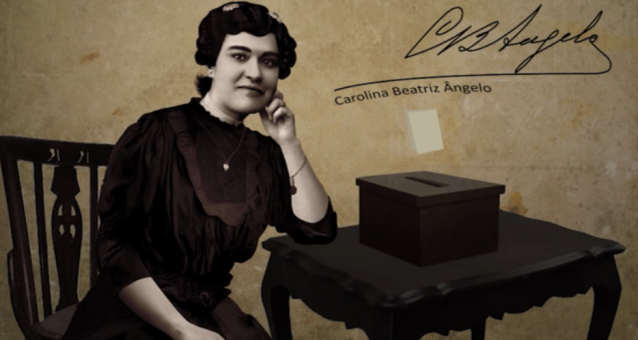Portuguese Platform for Women’s Rights awarded “Carolina Beatriz Ângelo Prize” on International Women’s Day

The Portuguese Platform for Women’s Rights (PpDM) received the Beatriz Ângelo Prize on International Women’s Day 2023. Awarded by the municipality of Odivelas and named in honor of one of the most outstanding feminists in our country, this distinction encourages us to continue our work with renewed energy.
In a time when women were not expected to vote, or even to want to vote, and women’s suffrage in Europe was only granted in Finland, Carolina Beatriz Ângelo, a Portuguese feminist activist, was the first woman to vote in Portugal, in the national elections of 1911.
Beatriz Ângelo used a loophole in the legislation, which stated that only Portuguese citizens heads of family over the age of 21, and who could read and write, were eligible to vote. The text did not explicitly state that only men could vote, as it apparently didn’t foresee the possibility that some women might fit this profile. Such was, nevertheless, the case of Carolina Beatriz Ângelo: a Portuguese citizen, a gynecologist, and, as a widow and mother of a little girl, head of her own family. Therefore, she applied to vote.
Her daring endeavor was nevertheless rejected, but with strong determination she took the matter to court, where she was proven right, thus becoming the only female voter in the country election of May 28, 1911.
The event was deemed a scandal in national and international press as she defended her position in the media and in the organisations she belonged to, and both support and criticism emerged from England to the Netherlands, and support telegrams from France. The backlash came later (1913) when the male dominated Parliament produced new legislation, this time specifically stating that only men were eligible to vote.
Carolina Beatriz Ângelo passed away at the age of 33. Portuguese women had to wait twenty years (1931) to be able to vote again, although only at the local level and under very limited circumstances. Under the Estado Novo dictatorship (1933-1974), very limited and slow progress was made in the way of granting Portuguese women voting rights and eligibility for public office. They had to wait for the Carnation Revolution of 1974 - 63 years after Carolina Beatriz Ângelo - before enjoying universal civil and political rights.
In the award ceremony, the Municipality of Odivelas praised the persistent work of PpDM, citing our meritorious and enduring activity in several domains, and highlighting the valuable contribution of PpDM for the definition, implementation, and evaluation of public policies on equality between women and men in Portugal. PpDM’s expertise and intervention at the local, national, European, and international levels was also emphasized.
The Portuguese Platform for Women’s Rights is deeply honored by this award enshrining the memory of the pioneering Portuguese feminists of the first decades of the 20th century.




